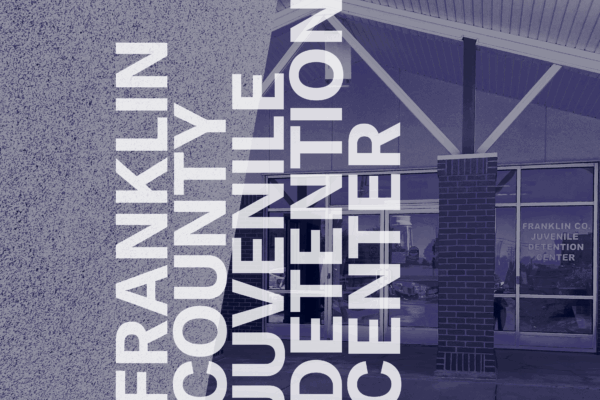In the Summer of 2023, the ACLU of Illinois filed a lawsuit challenging conditions at the Franklin County Juvenile Detention Center. In early January 2024, Franklin County closed the facility. Alexis Picard, Legal Fellow at the ACLU of Illinois, sat down to discuss the case and the most recent developments.
Could you tell us about how the ACLU’s investigation of Juvenile Detention Centers (JDC) came about?
We started looking into JDC conditions based on what we learned from the ACLU’s R.J. case, which is a case on behalf of kids in Illinois youth prisons. The ACLU of Illinois has been litigating the R.J. case for more than a decade and it is now in a remedial phase. As part of the ongoing remedial phase, we interview our youth clients who are currently at Illinois Department of Juvenile Justice (IDJJ) facilities, also called Illinois Youth Centers (IYCs). Throughout our interviews, we kept hearing kids say, “This IYC is much better than the JDC I was at six months ago.” There was always this comparison between the conditions in the IYCs and those in the JDCs. This put us on notice to the fact that we might want to look into these JDCs.
What were the conditions of Franklin County Juvenile Detention Center in particular that led to its eventual closing?
The conditions at Franklin County JDC were among the worst we've ever seen, especially with the use of solitary confinement. In the case of Franklin County JDC, children were locked in their cells anywhere between 20 to 24 hours a day—and sometimes for multiple days in a row. The use of solitary confinement at the facility was astronomical. You can only imagine what solitary confinement and that kind of isolation does to a child who is in a vulnerable developmental stage in their lives. Maybe this is the first time they are away from their family, maybe this is the first time they have ever been detained, and then you put them in a cell the size of a parking spot with a cement slab as a bed, a thin mattress, and a combined toilet-sink, and lock them in there by themselves day and night. It’s terrifying to imagine what a child as young as 13 or 14 goes through in that environment.
The second big issue was that there were no mental health professionals at the facility. So, if a child arrives at the facility with past trauma or if a child is experiencing trauma as a result of their detention there was no mental health provider there to help them. Some of the kids we interviewed who were currently or had previously been at the facility said they really wanted to speak with a mental health professional but were not able to.
While solitary confinement and a lack of mental health resources were two major issues in the case, as you can see from our complaint, there were a myriad of other conditions of confinement that are problematic and unconstitutional. As just a few examples, kids weren’t getting enough recreation time and the food that they were given is not healthy or up to sufficient nutritional standards. A big problem at the facility was also the lack of education. Kids were given worksheets that they had to do by themselves in their cells or dayroom. They were rarely given direct instructions from a teacher and yet were still expected to learn and be a student in that kind of environment.
In June 2023, we filed a lawsuit against several defendants due to the appalling conditions at Franklin County JDC. This was filed as a putative class action on behalf of all current and future youth at the facility, seeking injunctive relief.
And as your question alludes to, the Franklin County JDC officially closed its doors on December 31, 2023. This is a big victory, and we view the closure of Franklin County JDC as the best outcome, taking into account the facility’s current conditions and financial limitations for providing constitutionally adequate care and services to the youth.
So, what is next for this project area? Are there other similarly problematic JDC’s that we are investigating?
We’re monitoring conditions at other JDCs and may consider legal action against one or more of them in the near future. We’re aware that certain JDCs are significantly worse and more problematic than others, as was the case with Franklin County, and we will keep a close eye on those facilities as we continue to investigate the JDCs.

